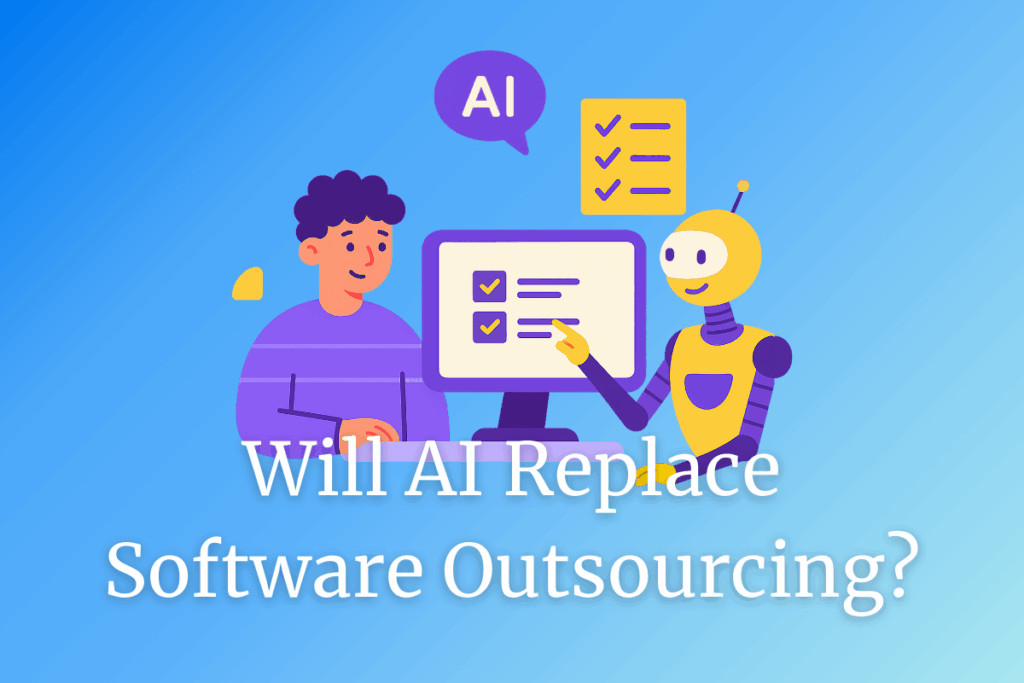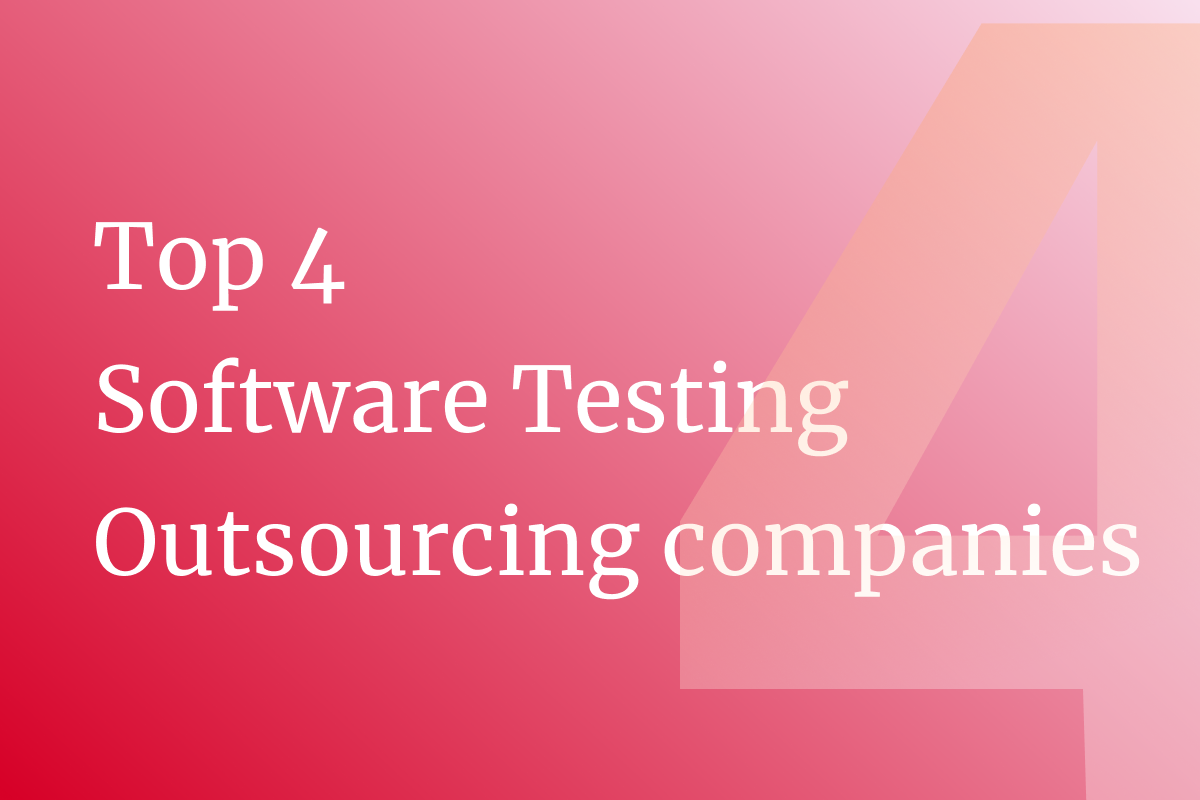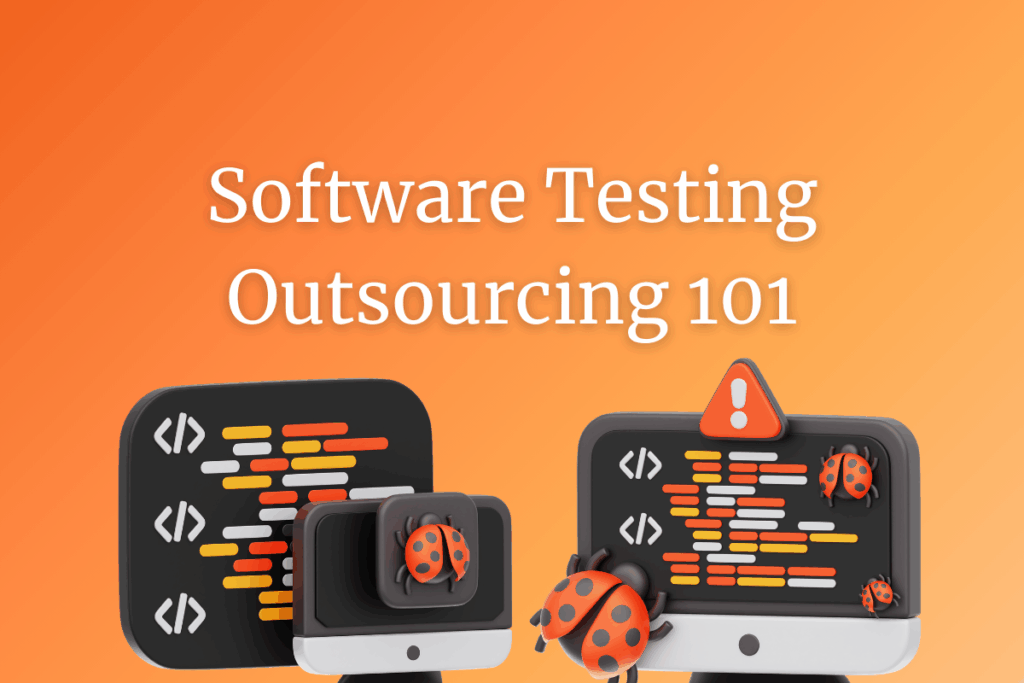In recent years, the rapid adoption of artificial intelligence across industries has led to a new wave of smart automation tools, and software development is no exception. With the rise of AI-powered platforms like Github Copilot or Claude, and more, businesses now have access to tools that can auto-generate test cases, identify UI changes, run tests in parallel, and provide intelligent insights with minimal human intervention.
This technological leap raises a critical question: Will companies continue relying on software outsourcing partners when AI can write code, test applications, and analyze requirements?
The debate over whether artificial intelligence (AI) will replace software outsourcing has emerged as a pivotal topic in the tech industry. It highlights the transformative impact of AI technologies on traditional business models. As organizations increasingly integrate AI into software development processes, the implications for outsourcing practices are profound, prompting discussions about workforce dynamics, cost efficiency, and the evolving roles of human developers.
As a leading QA partner, we see the answer not as a binary “yes or no” but as a shifting equation that calls for adaptation, reinvention, and a forward-thinking strategy.
Software Development is more than automation
The concept of automation in software development has its roots in the early part of the twentieth century, with initial developments occurring alongside mechanical automation and early calculating machines. As artificial intelligence (AI) technologies matured, their integration into software development practices accelerated. The rapid adoption of AI has fundamentally transformed how software is developed, tested, and maintained. By automating repetitive tasks such as code generation, debugging, and testing, AI has enhanced efficiency and reduced costs in the software outsourcing sector. This integration allows developers to focus on more complex design and architectural challenges, indicating a significant shift in the industry landscape. Additionally, AI’s capabilities in intelligent insights and predictions have improved the overall quality of software, posing opportunities and challenges for traditional outsourcing practices as these technologies evolve.
Outsourcing is not merely about offloading tasks but solving complex problems at scale. AI can assist in writing code, running tests, or analyzing data, but it still lacks the human capabilities of:
- Understanding evolving business requirements
- Navigating organizational dynamics
- Making contextual decisions under ambiguity
- Designing systems with empathy and creativity
AI can accelerate development, but it does not replace end-to-end software engineering and product thinking, which are core strengths of software outsourcing companies.
Understanding the Shift: How is AI Impacting the Outsourcing Model?
Traditional Outsourcing Model
For many years, companies have relied on outsourcing as a strategic approach to manage their Quality Assurance (QA) processes. The traditional outsourcing model provided several advantages, allowing organizations to:
1. Reduce In-House Headcount and Operational Costs: By outsourcing, companies could significantly lower their workforce expenses. This included salaries and associated costs such as training and equipment. The outsourcing approach enabled businesses to maintain a leaner operation while still ensuring high-quality standards.
2. Access Skilled Engineers and Automation Experts: Outsourcing allowed organizations to tap into a broader talent pool, gaining access to experienced engineers and specialists in software development and software testing who may not be available locally. This helped enhance the quality of development and testing and ensured that the latest methodologies were applied.
3. Accelerate Time-to-Market Through Scalable External Teams: By utilizing external teams, companies could scale their development efforts rapidly in response to project demands. This flexibility enabled faster iteration cycles and quicker releases, which is critical in today’s fast-paced software development landscape.
Outsourcing companies like SHIFT ASIA exemplified this traditional model by offering dedicated development and testing services that combined manual and automated testing tailored specifically to meet their clients’ unique requirements.
The AI-Enhanced Model
In recent years, AI-driven tools have prompted a significant transformation in the software outsourcing landscape. As artificial intelligence technologies become increasingly advanced, many functions that were once performed manually are now being partially automated. Key processes such as code review, writing regression tests, tracking user interface changes, and validating form inputs can now be handled more efficiently with AI.
This evolution disrupts the traditional value chain of software outsourcing by shifting the focus from merely supplying labor to emphasizing the provision of additional value through expertise and strategic insight. Outsourcing partners must now adapt by integrating advanced AI capabilities into their service offerings.
For example, outsourcing partners are expected to deliver strategic guidance on leveraging AI for enhanced software testing efficiency rather than simply executing tests. They must deeply understand AI technologies and how to integrate them into existing workflows, transforming their role from service providers to strategic collaborators.
As a result, the relationship between companies and software outsourcing partners is evolving, necessitating a higher level of collaboration and innovation as they navigate this new landscape powered by AI technology. Companies no longer ask “How can we cut costs with outsourcing?” but rather: “What kind of partner can help us use AI to deliver better, faster, and smarter?”
AI Still Requires Expert Supervision
Just like any sophisticated tool, effective use of AI demands:
- Proper Configuration: AI tools can produce suboptimal results without careful setup.
- Accurate Interpretation: The output generated by AI must be thoroughly analyzed and evaluated by human experts to derive meaningful insights and avoid errors.
- Ongoing Maintenance: AI systems require regular updates and adjustments to keep pace with evolving technologies and business needs.
Companies that attempt to deploy AI tools without the necessary technical oversight often face challenges such as false positives, integration issues, and test failures. This highlights a new demand for outsourcing partners who possess AI literacy and relevant domain expertise, ensuring that AI is utilized effectively without compromising quality or security.
The Impact of AI on Software Outsourcing
Artificial intelligence (AI) is significantly reshaping the landscape of software outsourcing, introducing both transformative benefits and challenges. Integrating AI into the software development process has prompted a dynamic shift in workforce roles, market demands, and customer expectations, resulting in a reevaluation of traditional outsourcing models.
Workforce Transformation
One of the most profound impacts of AI in software outsourcing is the alteration of the workforce dynamic. AI systems are increasingly capable of automating repetitive and routine tasks that historically required human intervention. This automation reduces reliance on humans as the sole knowledge holders and shifts job roles towards more AI-related positions. Consequently, the job market is evolving, necessitating new skill sets and knowledge requirements to integrate AI technologies effectively in software development.
Enhanced User Experience and Innovation
AI also fosters innovation by enabling the development of sophisticated software solutions that improve user experience. By analyzing user behavior and preferences, AI tools can provide insights for designing more intuitive interfaces, thus enhancing user engagement. Furthermore, AI’s capacity to process vast amounts of data quickly allows outsourced teams to stay updated on emerging trends and technologies, fostering a competitive edge in the market.
Challenges and Ethical Considerations
Despite AI’s numerous advantages to software outsourcing, its integration is not without challenges. Key concerns include ensuring data quality and maintaining security protocols. AI algorithms require high-quality, relevant data for effective operation, and the integrity of this data is crucial for successful implementation. Moreover, ethical considerations surrounding data privacy and the potential displacement of jobs raise important questions that organizations must address as they adopt AI solutions.
Productivity Gains and Cost Efficiency
AI has demonstrated the potential for substantial productivity gains in software development. By automating routine tasks, AI can enhance coding efficiency and allow developers to focus on more complex decision-making processes related to software design and architecture. Studies indicate that organizations adopting AI in their development processes can see efficiency improvements ranging from 30% to 42%. These enhancements lead to cost reductions and accelerate time-to-market for software products, making outsourcing increasingly attractive for businesses.
Future Trends
Integrating artificial intelligence (AI) and automation technologies will significantly shape the future of software outsourcing. As businesses strive to remain competitive in an increasingly digital landscape, adopting AI-driven tools is expected to enhance efficiency and drive innovation in outsourcing practices. This shift is anticipated to result in smarter, faster, and more secure software solutions that align with companies’ growth strategies in various industries.
AI is predicted to revolutionize traditional IT, including IT outsourcing (ITO) and business process outsourcing (BPO). By leveraging AI, companies can analyze their operational data more effectively and adapt to emerging trends, enabling them to optimize processes and focus on high-value services that demand human expertise and creativity. This evolution underscores a crucial aspect of future differentiation in outsourcing: the quality of data processing and human talent will remain pivotal even as AI technologies become more prevalent.
Why Relying Solely on AI Tools is Insufficient for Software Development
The rise of AI-powered tools has significantly influenced how applications are built and tested. However, these technologies alone do not guarantee robust, scalable, or successful software. A more holistic approach is essential, one that blends intelligent automation with human-led expertise. Here’s why:
1. Limited Understanding of Product Vision and Business Context
AI can generate code snippets or test scripts, but cannot fully grasp your product’s vision, business model, or customer expectations. It may execute logic but lacks the discernment to align technical outputs with real-world business goals. Critical nuances like prioritizing user experience or aligning features with market strategy still require human judgment and product sense.
2. Complex Systems Require Engineering Depth
Modern software solutions involve various technologies, from microservices and APIs to third-party integrations and cloud-native infrastructure. Designing, coding, and testing across such environments demands architectural thinking, cross-domain knowledge, and problem-solving skills that AI tools alone cannot replicate. Human engineers remain essential to ensure coherence, performance, and maintainability.
3. Strategic Decision-Making Goes Beyond Automation
AI lacks the strategic insight needed to make high-level decisions, such as choosing the right tech stack, defining delivery priorities, or managing trade-offs between time, cost, and scope. Successful software development requires a deep understanding of business objectives, user behavior, and market trends insight that only experienced professionals can bring.
4. Code and Test Maintenance Is an Ongoing Human Task
AI-generated code or automated tests often suffer from fragility and drift. As applications evolve, dependencies change, and edge cases emerge, requiring active intervention to refactor, optimize, or revalidate outputs. Without continuous oversight, reliance on automation can lead to bloated, brittle systems that underperform or introduce new risks.
The SHIFT ASIA Advantage: Augmenting Development with Human-Led Intelligence
At SHIFT ASIA, GenAI is a powerful enabler, but not a replacement, for smart software engineering. Our approach combines cutting-edge AI tooling with hands-on human expertise to deliver reliable, scalable, and business-aligned software solutions. Here’s what sets us apart:
✅ AI-Augmented Development & Testing
We integrate AI tools to accelerate routine tasks, enhance coding efficiency, and streamline testing efforts. This frees our teams to focus on innovation, architecture, and optimization, delivering higher value per sprint.
✅ Human-Led Engineering Strategy
Our developers, testers, and architects bring deep technical know-how and industry understanding to every project. We design software with long-term maintainability, performance, and user relevance in mind, something AI can’t do independently.
✅ Custom, Scalable Frameworks
Rather than relying on off-the-shelf automation or generic AI scripts, we build tailored solutions that adapt to your product roadmap, tech stack, and operational needs, ensuring resilience and adaptability at every stage.
✅ Industry-Aligned Product Thinking
With experience across industries like fintech, retail, travel, and SaaS, our teams validate not just code quality or test coverage but also how well the software supports your business goals, customer journeys, and competitive differentiation.
“AI Can Build Faster, But It Can’t Think Strategically — That’s Where We Come In.”
While AI tools offer speed, they cannot replace the depth of experience, contextual understanding, and strategic guidance needed to deliver high-performing, future-ready software. At SHIFT ASIA, we don’t compete with AI; we enhance it.
Our engineers and testers leverage AI to eliminate bottlenecks and optimize delivery while fully owning your product’s reliability, usability, and long-term success.
From architecture design to system integration, from automated testing to product delivery, we partner with clients not just to execute tasks, but to co-create value.
Partner with SHIFT ASIA to build better software through the combined force of intelligent automation and expert-led engineering.
Strategic Outlook for Software Outsource
It’s Not a Question of AI vs. Outsourcing – It’s About AI in Outsourcing.
Instead of pondering whether AI will replace outsourcing, a more insightful question is: “How will outsourcing companies leverage AI to drive better outcomes and deliver projects more swiftly?”
At SHIFT ASIA, we believe that the future of outsourcing goes beyond the notion of merely seeking cost efficiencies through labor. It’s about embracing a paradigm of intelligent delivery, where AI augments human capabilities and skilled professionals lead quality engineering. This evolution paves the way for creating more innovative, effective, and empathetic software solutions that meet the needs of tomorrow’s businesses. As outsourcing partners increasingly leverage AI and automation tools, the focus will likely shift from mere cost reduction to strategic innovation, positioning companies for long-term success in a competitive marketplace.
ContactContact
Stay in touch with Us




